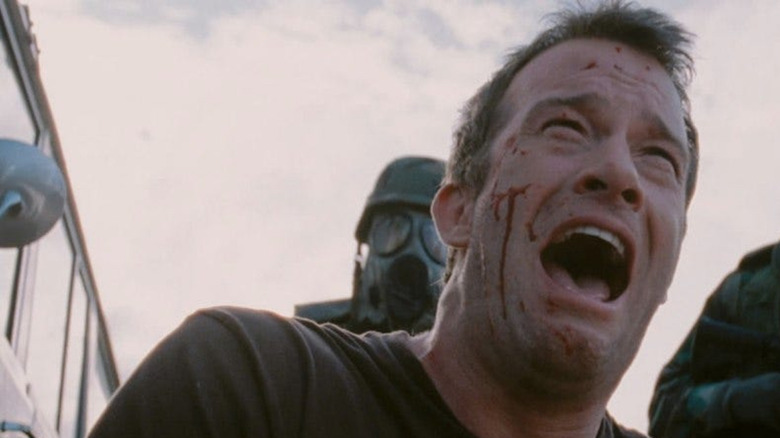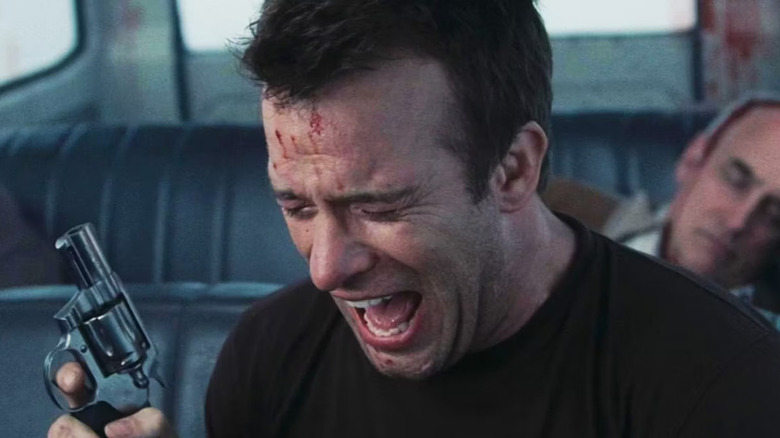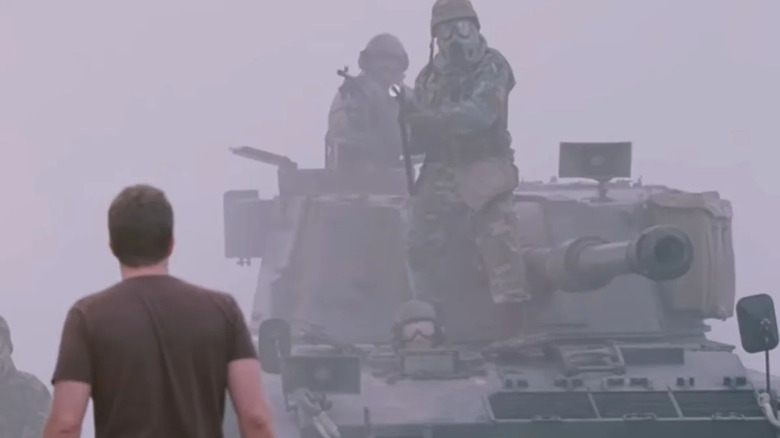What Stephen King Thinks About The Mist Movie Ending
"The Mist" has arguably one of the bleakest horror movie endings of all time, and that's saying something. Adapting the Stephen King novella of the same name, writer-director Frank Darabont created a finale that feels utterly cruel and overwhelmingly dark. It's worth noting that this is an ending Darabont created himself — King's novella ends on a dark but potentially hopeful note, whereas Darabont's ending seems to be saying there's no hope to be found anywhere. It's designed to make you feel bad.
Darabont, for his part, says he merely seized on a suggestion from King's story itself. "I thought, 'If we're gonna make a horror movie based on a Stephen King story, let's take Steve's most horrible, dour, and darkest thought and follow it out to its logical conclusion," Darabont said. "It really is from Stephen King, although he himself didn't realize it until I read that line back to him."
King himself has been open about the ending, and even approved of what Darabont conjured up. But before we get to King's thoughts, let's break down what happens during the end of "The Mist" movie, shall we? Major spoilers follow.
What happens at the end of The Mist
In "The Mist," a group of people find themselves trapped in a supermarket when a mysterious, otherworldly mist rolls in and engulfs everything. David Drayton (Thomas Jane) and his young son Billy (Nathan Gamble) are among those trapped within the market, and David is one of the first to realize this is no ordinary mist. There are monstrous creatures lurking, ready to kill anyone who dares step outside. Unfortunately, things inside aren't so great, either. A religious nut named Mrs. Carmody (Marcia Gay Harden) is stirring up people's emotions and making them think this deadly mist is some sort of punishment from God.
After several mishaps (and deaths), David, Billy, a woman named Amanda (Laurie Holden), an older guy named Dan (Jeffrey DeMunn), and an elderly woman named Irene (Frances Sternhagen) escape the market in David's car, with David clutching a loaded gun. First, they travel to David's home, where he finds his wife has been killed. Then they head out onto the road, hoping to escape the mist. But the mist is everywhere. During their travels, they cross paths with a massive Lovecraftian monster. Feeling hopeless, the survivors decide to end it all. The task falls to David — but he only has four bullets in the gun, which he uses on everyone else (including his son). Now, David, splattered with blood, is the only one left alive.
David hears something rumbling outside the car, and assumes it's one of the mist monsters. Clearly out of his mind at this point, David steps outside, hoping the monster will come kill him. But it's not a monster — it's the military, who are in the process of killing the monsters and clearing the mist. If David had just waited a few minutes, his son and everyone else he killed would've been saved. The film then ends on David's horrified, insane screams, and we're all left feeling awful.
What Stephen King thinks about The Mist ending
As mentioned above, this film ending is different from how King ends things in his novella. For the most part, the movie is a very faithful adaptation of King's story. However, once David and the other characters escape the market and hop in his car, things differ. Instead of deciding to die by suicide, David and his fellow survivors vow to just keep driving, hoping against hope that they'll find an escape from the mist. At one point, David scans the radio and thinks he hears someone say "Hartford," suggesting that might be a safe zone. Here, King ends things, with a slight glimmer of hope that maybe, just maybe, the characters will reach Hartford and be saved.
So what does King think of the movie's drastically different ending? In his non-fiction book "Danse Macabre," King says of "The Mist":
"The ending will tear your heart out . . . but so will life, in the end. Frank Darabont's vision of hell is completely uncompromising. If you want sweet, the Hollywood establishment will be pleased to serve you at the cineplex, believe me, but if you want something that feels real, come here. Darabont could have made a higher-budget film if he'd added a cheerful 'It's all OK, kiddies' ending, but he refused. His integrity and courage shine in every scene."
In other words, King is happy about the different ending. Or at least as happy as someone can be regarding such a bleak finale. It's a nasty, visceral ending, and what's more horrifying than that?


